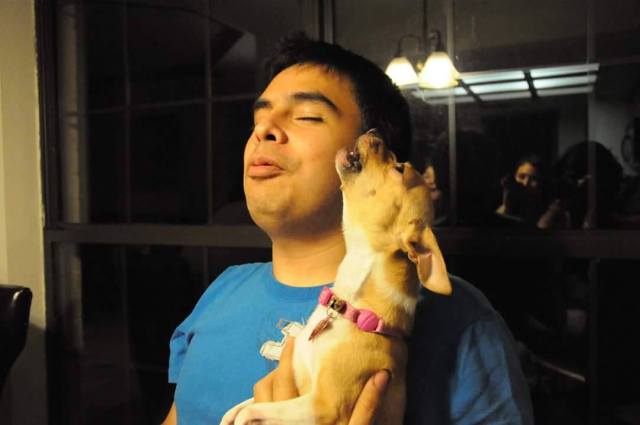Artist Profile: Hugo Esteban Rodríguez

Name: Hugo Esteban Rodríguez Castañeda
Hometown: Heroica Matamoros, Tamaulipas, Mexico; and Brownsville, Texas, U.S.A. To clarify, I was born and raised in Matamoros but came to adulthood in Brownsville, so I’m both from Mexico and the Rio Grande Valley.
Residence: Houston, Texas.
What is your earliest memory of writing? I want to say writing bad fan-fiction when I was 12, but I also have vague memories of the year before, being in the fifth grade and writing my own “school newspaper” and reporting on elementary school drama.
How did you become a writer?
I grew up surrounded by books and learned to love them because of my father and grandfather. It was only a natural jump to go from seeing how much books could do for people to wanting to evoke that same kind of feeling myself. I think the best way I can explain this is when I was reading the Harry Potter series as a kid, I felt actual regret that I couldn’t go to Hogwarts. I’ve always been enthralled by superheroes and supervillains, so I believe that being able to create those emotions with just your words is as close as I’ll get to actual superpowers. Plus, if videogames have taught me anything, it’s that getting bombarded with heavy doses of radiation isn’t exactly healthy.
Tell us about your writing process.
It’s a two-part process given that I am both a poet and a writer. For my poetry, I write out my poems in a journal I carry with me most of the time. Then I let them sit there for a week, then once the week passes, I take a look at the poem again and type it up. If I like it, I’ll save it in a ‘holding’ folder on my computer, then revisit it in a week and if it is good enough, I add it to my collection. If it at any point in the process I don’t like it, I’ll salvage what I can and then I start over.
For my fiction, I have a much more simpler approach. I just channel the inner voice that goes, “Wow! Wouldn’t it be cool if…” and write stories on that without placing limits on how weird, boring, or strange something is. I have a piece out that’s based on a time-traveling swimming pool. I have another that’s an ode to alienation featuring a man that is also a car, and I recently wrote a story about skin cells in a mattress. Hell, sometimes I’ll just stack up two poems together and make a story out of it.
What are you working on now?
A lot! My main focus right now is seeking representation for my first manuscript, a collection of short stories with the common theme of mental illness. My other projects include writing more flash fiction in the hopes of creating a second short story collection. I’m also planning on finishing the edits to my poetry manuscript. And ALSO I just added a vlog component to my website, so I’ve been pretty busy outside my day job.
Have you ever suffered from writer’s block?
There are two kinds of writers: Those who have struggled with writer’s block; and damn liars.
Which writers and teachers have most influenced you as a writer?
I’m blessed that every teacher I’ve had has influenced me in one way or another. But I’d like to take some time to honor them. In elementary school, my teacher Ms. Diaz really emphasized the importance of reading and writing. In high school, Mrs. Saenz really reinforced the importance of having discipline, which is absolutely instrumental for any writer. In college, Azenett Cornejo was the program coordinator for the student newspaper where I worked throughout my undergraduate career. There’s a lot of lessons I learned from her that I still employ in my day-to-day life as both a writer and as a grown adult, but if there’s one trait she nurtured in me, was the importance of having an eye for detail and thinking on my feet. Finally, in my MFA program, I had the privilege and opportunity of learning under the tutelage of established poets and writers. If I’m picking two, I’m picking Sasha Pimentel and Daniel Chacón. Professor Pimentel taught me to love poetry, and Professor Chacón, was instrumental in placing me on the short story track I’m in.
What books have had the biggest impact on your trajectory?
- Howard Zinn’s A People’s History of the United States
- JK Rowling’s Harry Potter and the Goblet of Fire
- William King’s Trollslayer (from the Gotrek and Felix series)
- Stephen King’s On Writing
- Erich Maria Remarque’s All Quiet on the Western Front
- Benjamin Alire Saenz’s Everything Begins and Ends at the Kentucky Club
What’s your advice to aspiring writers?
There’s a lot of hard work involved in this field. There’s going to be some nights you’re going to pass out at your desk. There’s going to be times when you forget to eat. This field is going to take your blood, sweat, tears and time and…it’s going to be worth it. You are going to come up with something that’s going to make people feel and it is such a rewarding feeling when you see that. Another thing I’d advice is take on day jobs if you have to. There’s no shame in wanting to be gainfully employed while you work on a writing career. Some people glorify the “starving” part of “starving artist” and it’s a bit nonsensical. You don’t have to be homeless or unemployed to have the kind of hustle, hunger, and chip on shoulder necessary to thrive in this field.
***For more on Hugo Esteban Rodríguez, see:
- Hugo Esteban Rodríguez’s Personal Website
- Hugo Esteban Rodríguez’s Bio
- Hugo Esteban Rodríguez’s Publications
- Dos Aguilas TV
- Read The Ritual
- Follow Hugo Esteban Rodríguez on Twitter
